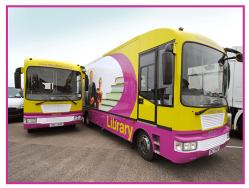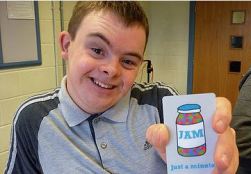 16 mobile libraries deliver services to rural areas, schools that can’t travel to their local library and to training centres. All mobile libraries are fully accessible to wheelchair users and people with mobility issues. The Homecall Service delivers books, books on CD and large print books to people with reduced mobility who cannot visit a library or mobile library independently.
16 mobile libraries deliver services to rural areas, schools that can’t travel to their local library and to training centres. All mobile libraries are fully accessible to wheelchair users and people with mobility issues. The Homecall Service delivers books, books on CD and large print books to people with reduced mobility who cannot visit a library or mobile library independently.
One of the duties that the Disability Discrimination Act imposes on service providers is the duty to make reasonable adjustments to physical features where doing so would help disabled people to use or gain access to the main services or facilities being offered. The duty does not merely require that the physical feature be removed, altered, avoided, it also requires that consideration be given to providing a service through alternative methods.
The action taken by Libraries NI to make mobile services accessible to disabled customers is an example of such an alternative method.
Kilkeel Library
Kilkeel Library opened in 2014 and was awarded the William Keown Trust Award as a good practice example of an accessible building for disabled people. Like other organisations, Kilkeel Library considered access into and out of their building; however, they also addressed additional issues such as good colour contrast in the decor and the use of different types of chairs for those with mobility issues.
 Lisburn Road Library, Belfast
Lisburn Road Library, Belfast
The recently refurbished library on the Lisburn Road, Belfast, features improved disability access with disability friendly parking, ramps, handrails, automatic doors, low counters and wide walkways.
The Disability Discrimination Act 1995 requires service providers to take reasonable steps to provide auxiliary aids and services if this would enable or make it easier for the disabled person to make use of the service. The duty requires service providers to anticipate potential barriers that disabled customers might face in accessing services and to identify potential solutions.
Libraries NI sought to actively comply with this anticipatory and continuous duty by providing:
- Audio books and eBooks in a variety of types, sizes and colours
- A dyslexia specific website section which outlines the dyslexia friendly services available to its customers
- JAWS software on library computers for people with visual impairments
Autism and dementia
In 2016, the Libraries NI Service Plan focused on people with dementia and people with autism and they are working towards creating autism and dementia friendly services. The plan includes activities such as story-telling in memory cafes for people with dementia and drama/workshops and storytelling for children with autism. Libraries NI has engaged a professional storyteller-in-residence through the Jim and Peg Armstrong Bursary to train library staff specifically in storytelling techniques for people with dementia and autism.
Mental ill health
The Library Services has engaged in activities which have promoted positive attitudes towards people with mental ill health and encouraged these customers to use library services through:
- Knit and Natter sessions
- Mindfulness colouring and crafts
- Creative writing through the Reminiscence Programme.
Visual impairments
A reading group for people with visual impairments started in Holywood Library twenty years ago and there are now five groups across Libraries NI. The programme provides a social activity and reading group with books in accessible formats such as CD, MP3 and/or large print.
Browsealoud is being piloted in nine libraries and is funded by Libraries NI and Department of Finance. Browsealoud is innovative software which adds speech, reading and translation to websites facilitating access and participation for people with dyslexia, mild visual impairments and those with English as a second language. Features include text-to-speech, spoken and written translator, text magnifier and MP3 generator. (The Equality Commission uses Browsealoud on this website)
 Learning disabilities
Learning disabilities
The JAM (Just a Minute) initiative is being rolled out to a number of libraries. This will promote accessible services, improve communication and help people with a learning disability use library services more easily.
Libraries NI also supports the learning needs of children and young people with dyslexia by providing:
-
a detailed website section outlining all the services available for those with dyslexia
-
dyslexia friendly books
-
Information books on dyslexia for children, young people, parents and carers
Characteristics of dyslexia friendly books can include:
-
gently tinted background behind the text to reduce the glare
-
special line, character and paragraph spacing
-
short word lengths so readers can enjoy the achievement of finishing a book
-
stories pitched at the real age of the reader and not the reading age
-
stories by well known authors.
This is a snapshot of the work of Libraries NI and it highlights that this organisation is not merely trying to comply with Part 3 of the Disability Discrimination Act and their statutory equality duties, but is seeking to improve the lives of disabled people in Northern Ireland and is also promoting good equality practice.
All of these activities are examples of meeting section 49A- promoting disabled people in public life and promoting positive attitudes towards disabled people.
It is interesting to note that what is driving this good practice work is the desire to make all of the library services available to all of the people of Northern Ireland and where necessary thinking of innovative ways of overcoming barriers.
Disabled people are not the sole beneficiaries of this good practice as older people, mothers with young children, carers and those whose first language is not English are just some of the other social groups to benefit.